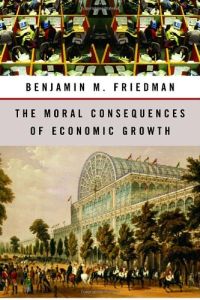Join getAbstract to access the summary!

Join getAbstract to access the summary!
Benjamin M. Friedman
The Moral Consequences of Economic Growth
Knopf, 2005
What's inside?
When economic times are good, societies are more moral. And when economic times are bad – everything is bad.
Recommendation
Although professor Benjamin M. Friedman teaches economics at Harvard, this book is not mainly about economics; it is mostly about morality. Friedman goes beyond traditional academic boundaries to propose that the moral tone of various Western democratic societies is connected to their economic growth. This impressive effort may introduce you to potential connections you might otherwise have ignored. However, Friedman offers both sides of the picture in this thought-provoking book that offers a great deal of valuable insight into a seldom-considered aspect of economic growth.
Summary
About the Author
Benjamin M. Friedman is the William Joseph Maier Professor of Political Economy and formerly chairman of the Department of Economics at Harvard University.


















Comment on this summary